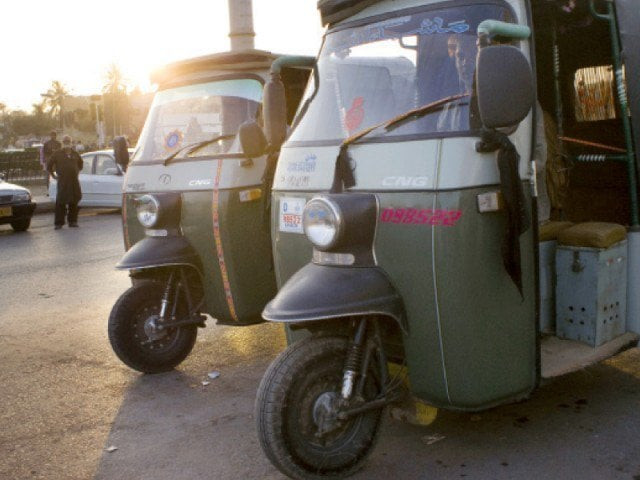FBR ban on non-filers hits auto rickshaw industry
If the government does not relax the ban, buyers will stop purchasing new rickshaws

PHOTO: EXPRESS
The Sindh Excise and Taxation Department, which registers the vehicles, was communicated the ban more than a week ago. "We haven't registered any rickshaw since October 17," an official of the department, who requested anonymity, claimed while talking to The Express Tribune." Up to 40 registration applications which were partially processed by October 17 have also been withheld." The disclosure manifests that these vehicles are mostly bought by non-filers whether the buyer is a driver or an investor.
Under the new policy, non-filers cannot buy and register in their names the vehicles with engine displacement of 200 cubic centimetres (CC) and above engine capacities. Only the vehicles and motorbikes below 200CC can be bought by non-filers. The rickshaws come with 200CC engine displacement.
FBR to audit those who declared assets but failed to pay tax
Through the Supplementary Finance Act, a new section 227C was inserted in the Income Tax Ordinance 2001, which placed a bar on accepting or processing applications for booking, registration or purchase of locally manufactured vehicles. Interestingly, the Federal Board of Revenue's (FBR) October 24 circular notes that the taxation authority has tried to avoid causing hardship to the low income groups by lifting certain restrictions.
"... non-filers shall also be at liberty to purchase agricultural tractors, motorcycle rickshaws, rickshaws and any other motor vehicle having engine capacity less than 200CC," reads the circular. It does not mention rickshaws with 200CC or above capacities.
According to Hyderabad Rickshaw Dealers Associations, around five dozen dealerships of various rickshaw manufacturing companies sell 400 to 500 of these vehicles every month in Hyderabad alone. "Thousands of files are pending registration with the dealerships," claimed Naeemuddin Yousufzai, general secretary of the association, adding that similar situation exists in other cities of Sindh.
He said that until last month, when the vehicle registration was not centralised in Sindh, a majority of rickshaws were bought from Hyderabad's dealerships and registered from the city's excise department. He added that even the buyers from Larkana, Nawabshah and Mirpurkhas divisions bought and registered these vehicles in Hyderabad.
Therefore, he contended, Hyderabad comes after Karachi in the largest number of pending registration cases.
A brand new vehicle can be registered with the excise department without penalty during first two months. After two months, the excise charges a penalty of Rs5,000 till the sixth month. The amount doubles to Rs10,000 from the seventh month onward.
"A majority of the rickshaw owners avail the two-month delayed registration facility so that they can generate the amount by providing transport service during that time. Many don't register till the sixth month," Yousufzai said, explaining the cause of thousands of pending files for the registration.
He believed that if the government does not relax the ban, the buyers will stop purchasing new rickshaws and opt for the used vehicles. "If this continues then the rickshaw owners, dealerships or the manufacturers won't be the only sufferers, the old used vehicles will brim the streets in the cities after few months contributing more to pollution."
Tasaduq Hussain Baloch, the association's president, argued that it was out of question for rickshaw drivers to suddenly become tax filers because the government without consultation with the stakeholders has imposed a new ban. "Most of them [the drivers] are illiterate. They are even unable to read their vehicle registration documents. We simply tell them to just remember that your registration file contains ten pages. How can they become the filers?"
PM Office gets ‘favoured officer’ appointed in FBR
Baloch claimed that the average monthly earning of a driver-owned rickshaw is around Rs20,000. If the vehicle is owned by an investor the income splits between the two, he added. "The government should have waived the condition of tax filer for this category of the vehicles in view of the sector's financial health and to allow the public an affordable transport."
Yousufzai claimed that 60% of new rickshaws are bought through leases spanning from two to three years, arguing that the financial status of the drivers does not allow them to become the filers. The association requested the federal government to review its decision. The office bearers said they are also consulting with the lawyers to challenge the tax in the court.
Under the new taxation regime, the government has exempted individuals in both the salaried and non-salaried income groups earning up to Rs400,000 per year from paying the tax. An income tax lawyer, Farukh, said that rickshaw drivers mostly fall in this category. "They don't have to pay the tax but they have to file the income tax returns to become a filer."
Published in The Express Tribune, October 29th, 2018.



















COMMENTS
Comments are moderated and generally will be posted if they are on-topic and not abusive.
For more information, please see our Comments FAQ